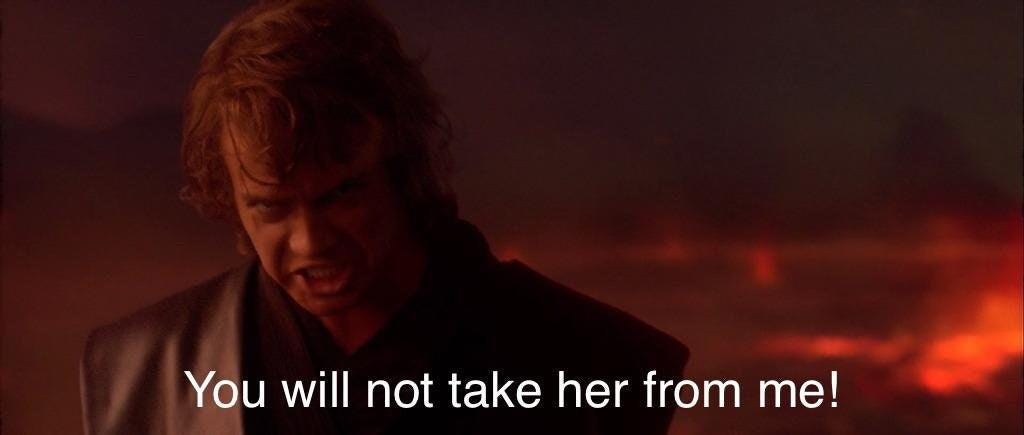You Can't Lose What You Don't Own
Anakin Skywalker, Epictetus and the trouble of attachment
Last night as I was preparing to hit the sack for some much-needed rest, I was thinking ahead to this morning and what I might write today. I couldn’t think of anything. I’d been working for a few hours on a script to support an upcoming Geeky Stoics video about Star Wars and philosophical differences between the Jedi and the Sith. The video is focused on how each side views the concept of “freedom” and what it takes to truly live free. I’m surprised now that I couldn’t think of anything to share with you. I want to talk to you about attachments and their costs.
Love and a golden lamp
Just as I was rising from my chair to trudge upstairs in defeat, a song that was playing over my laptop speakers spoke these words,
“From one monkey to another, you can’t lose what you don’t own.”
This is Noah Gundersen, a singer-songwriter who I’ve really fallen for this past year. The song is called “Robin Williams”.
I’m not sure what exactly Gundersen’s ballad is about besides a vague reference to the late comedian, but that particular line landed heavily. The whole script I’d been writing was about the Jedi’s skepticism toward romantic attachment. Songwriters have such an incredible superpower in their ability to sum up entire essays in one sentence.
What we own and what we believe to be ours is what we’ll stress over protecting. In Star Wars: Episode III we get the clearest possible picture of why the Jedi tended to avoid romantic relationships. Anakin Skywalker didn’t just love Padme Amidala, he coveted her. She became an object to him. A precious.
Even in the most healthy and loving of marriages, there is a certain kind of possessiveness that exists under the surface. It can manifest itself in jealousy at the friends they have outside of the home, or incredible anger at a sickness they’ve developed which may soon take their life.
Certain things never really belong to us.
In the first book of Discourses by the Stoic philosopher, Epictetus, there is a short story where a lamp is stolen from inside his home by a thief.
“I had an iron lamp which I keep by my household shrine. I heard a noise from the window, ran down, and found it stolen. I reasoned that the thief had an irresistible impulse to steal it. I said to myself, ‘Tomorrow get a cheaper, earthenware lamp.’ You can only lose what you have.”
See, there is to a cost to everything. Even with a fancy household lamp, there is the price tag you paid to acquire it, and there’s the emotional cost of then losing the lamp. You recognize the lamp was expensive, and therefore you value it above other possessions.
Even for the thief, there was a cost to the lamp he stole. Epictetus continues,
“He acquired the lamp at a price: he became a thief for its sake, for its sake, he lost his ability to be trusted, for a lamp he became a brute.
And he imagined he came out ahead.”
Life will be a lot cheaper when you’re dead
What I love about this story is that it shows us the invisible price tag of every action and possession. Your house has its monthly payments and annual taxes, but there’s also the variable cost of upkeep and repair. The cost of the new dog is more than the adoption fee. It will include medical bills for their first injury and the cost might also be you can’t take that vacation you wanted to take in the spring, because boarding the dog will be too much of an added expense. You make a fortune with a new job, but it consumes all of your time and you miss the most fun years of your child’s life. That paycheck had a hidden tax.
Romantic relationships and love comes with a cost too. We’ve all felt it. The worst pain and heartache you can imagine. Anxiety, swirling paranoid thoughts raging out of control like a tornado, and an unspeakable fear of loss for that connection.
You can see why the Jedi might have opted to possess less.
I haven’t emailed you today to discourage loving relationships or say that you should adopt the Jedi way of life in avoiding all attachments and possessions.
What I’m saying is that life will be a lot cheaper when you’re dead.
Pay the taxes. Anticipate and accept the hidden costs. Understand that you truly own very little. Most of what you have is borrowed, so don’t overly invest yourself in hoarding it. Once you’ve sincerely thought over the hidden costs, decide if you truly need this thing, person, or job to be happy.
Above all else, be thankful for the things and the people who pass in and out of your life. Gratitude has the power to reframe everything.
Have a great week my friends.
Geeky Stoics is on YouTube!
This month has been incredible for the growth of our YouTube channel, where we’re making videos based on the content you’ve been getting in your inbox. Here are the two most recent videos we’ve released!




'Do or Do Not, There Is No Try' video seems to be really popular on YouTube - well done, lads!
Good topic for discussions .. Thanks!